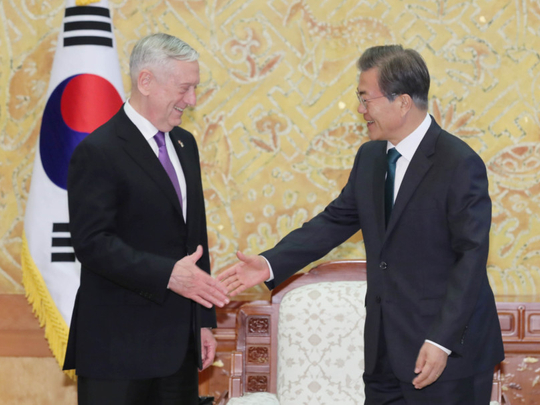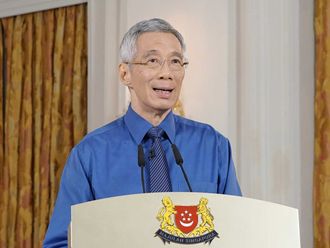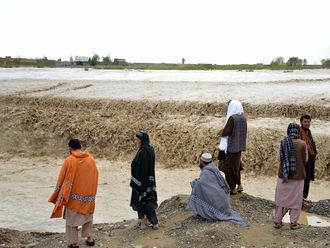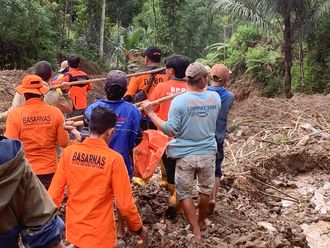
PANMUNJOM, Korea: US Defense Secretary Jim Mattis accused North Korea on Friday of building a nuclear arsenal to “threaten others with catastrophe” and said the Trump administration remains committed to compelling the North to accept complete nuclear disarmament.
Calling the North a threat to global order, Mattis stood inside the Demilitarized Zone that separates the two Koreas and pledged solidarity with the South.
“We stand should to shoulder with you and the Korean people in confronting the threats posed by the Kim Jong Un regime,” Mattis said as South Korean Defense Minister Song Young-moo looked on.
Mattis called the North “an oppressive regime that shackles its people, denying their freedom, their welfare and their human dignity in pursuit of nuclear weapons and their means of delivery in order to threaten others with catastrophe.”
Making time to visit a US-South Korean military observation post to peer into the North, Mattis was also briefed on conditions along the border created after a truce halted the Korean War in 1953.
Mattis arrived in South Korea earlier Friday to meet with the nation’s top defence officials and American military commanders on the front line in countering North Korea’s nuclear weapons programme.
Mattis is emphasising the Trump administration’s push for a diplomatic solution to the problem. But he also has said the US is prepared to take military action if the North does not halt its development of missiles that could strike the entirety of the United States, potentially with a nuclear warhead.
On his second trip as defence secretary to the US ally, Mattis will meet with South Korean officials as part of an annual consultation on defence issues on the Korean peninsula. He’ll be joined in Seoul by the chairman of the US Joint Chiefs of Staff, Gen. Joseph Dunford. President Donald Trump is scheduled to visit the city next month.
Two other developments Thursday showed the US intention to continue building diplomatic and economic pressure on Pyongyang. The Trump administration imposed sanctions on 10 North Korean officials and organisations over human rights abuses and censorship, including a diplomat in China accused of forcing North Korean asylum seekers home.
Meanwhile, a rare military exercise involving three of the US Navy’s aircraft carrier strike groups was being planned for next month in the Asia Pacific, a US official said. The likely exercise would happen around the time that Trump travels to the region.
Trump entered office declaring his commitment to solving the North Korea problem, asserting that he would succeed where his predecessors had failed. His administration has sought to increase pressure on Pyongyang through UN Security Council sanctions and other diplomatic efforts, but the North hasn’t budged from its goal of building a full-fledged nuclear arsenal, including missiles capable of striking the US mainland.
If Trump sticks to his pledge to stop the North from being able to threaten the US with a nuclear attack, something will have to give — either a negotiated tempering of the North’s ambitions or a US acceptance of the North as a nuclear power.
The other alternative would be US military action to attempt to neutralise or eliminate the North’s nuclear assets — a move fraught with risk for South Korea, Japan and the US.
Michael Swaine, an Asia defence analyst at the Carnegie Endowment for International Peace, sees little chance the North will cave in to international pressure and give up its nuclear weapons.
“I just think the United States is far away from coming to grips with this problem in North Korea,” Swaine said in an interview last week.
The US has about 28,500 troops based in South Korea and has maintained a military presence there since the Korean War ended.
The sanctions aimed at North Korean officials and organisations was announced in conjunction with a new State Department report on dire human rights conditions in the isolated nation said to include extrajudicial killings, forced labour, torture, prolonged arbitrary detention and rape. The report, required by Congress, highlights abuses the US says underwrite the North’s nuclear weapons programme, including revenues it derives from overseas labourers. Thousands of North Koreans are sent abroad every year to work in “slave-like” conditions, it says.












